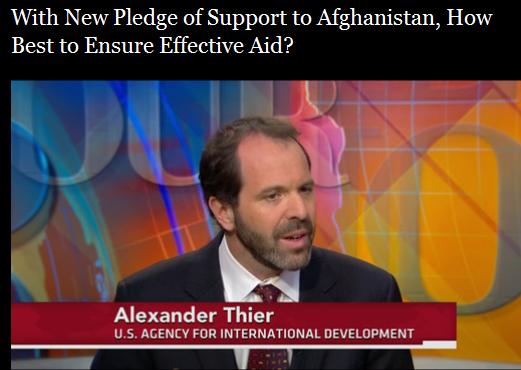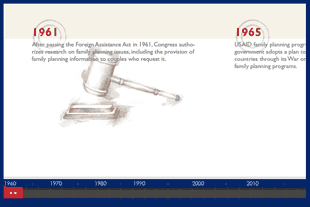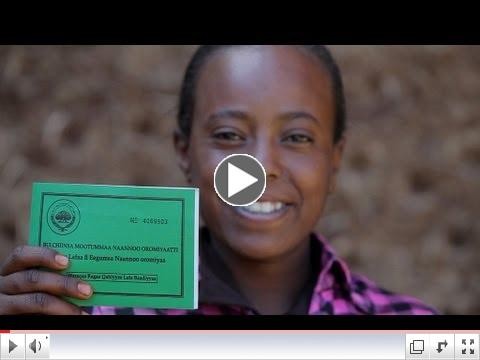
Volume Three, Issue Ten
World Leaders Reaffirm Commitment to Afghanistan

Over the past decade, Afghanistan has developed more rapidly than in any previous decade in the country's history. These gains remain fragile as we approach the political, economic and security transition to Afghan leadership in 2014. This past weekend, international donors, including USAID, met with Afghan leaders in Tokyo to define the future of partnership and economic cooperation for the next decade to ensure Afghanistan continues on its path of reform and self-sustainability. Earlier this week, Assistant to the Administrator, Alex Thier, appeared on PBS Newshour, to discuss the future of development in Afghanistan.
More Info:
- Remarks by the Director of the Office of Afghanistan and Pakistan Affairs Alex Thier on the State of Afghanistan
- Fact Sheet: July 7-9 Tokyo Conference on Afghanistan
- USAID in Afghanistan: Partnership, Progress, Perseverance
Impact Blog: Keeping Faith in Afghanistan
London Family Planning Summit
On July 11, World Population Day, the U.K. Government and the Bill & Melinda Gates Foundation, with UNFPA and other partners, hosted a summit to provide an additional 120 million women in the world's poorest countries with lifesaving contraceptives, information and services by 2020. The London Summit on Family Planning called for unprecedented global political commitment and resources to transform the lives of millions of women and girls, which will save lives and help lift families, communities and nations out of poverty.
More Info:
- USAID Family Planning Program Timeline: Before 1965 to the Present. View these major family planning milestones through this interactive feature.
- Impact Blog: Protecting the Lives of Women and Girls
- Storify Link: London Summit on Family Planning
- 24 Months for Pakistan's Health
- Family Planning Twitter Chat: USAID Global Health joins #FPChat
New Contraceptive Technologies Slideshow
How We Can End Preventable Child Deaths
This animated line drawing uses video to depict the aspirational goal of helping all children to reach age 5. Learn more about how we can work together to end preventable child deaths. Read more on the Agency's work in Child Survival.
New Land Tenure Podcast from the Editors of FrontLines
Land tenure, or helping people in developing countries establish clear rights to their property, is a little-known issue that is nonetheless essential to the global fight on poverty. This podcast, based on an interview with USAID's land tenure division chief, explains the issue and how the U.S. Government is helping secure property rights around the globe. Listen here.
USAID in the News
Still can't get enough of USAID? Here's what happened in the news this week. In advance of World Population Day on July 11 and the London Summit on Family Planning, the Financial Times reported on efforts to provide reproductive health services to women worldwide. According to the report, approximately 215 million women in developing nations who are seeking contraception cannot get it. Administrator Shah said, "Family planning has been a huge determinant of long-term development. We have an obligation and a real need to do a better job." The Guardian also reported that commitments made at the summit "will result in 200,000 fewer women dying in pregnancy and childbirth, more than 110 million fewer unintended pregnancies, over 50 million fewer abortions and nearly 3 million fewer babies dying in their first year of life."
New York Times Columnist, Nicholas Kristof, highlighted President Obama's Feed the Future initiative and the work performed by USAID to strengthen resilience, and address global hunger and food security. "President Obama has made agriculture a focus of his foreign aid programs," reports Kristof. "These initiatives are smart, cost-effective and potentially transformative." Also this week, in an interview with The Wall Street Journal, Administrator Shah discussed ways to improve food security in India. Shah cited that in addition to increasing agricultural production and productivity, addressing food security at the household level is necessary to ensure families have access to nutritious foods.
Want More Information? Follow the Impact Blog
In addition to our weekly newsletter, USAID has an active blog that covers USAID's programs around the world.











Comment
Make a general inquiry or suggest an improvement.